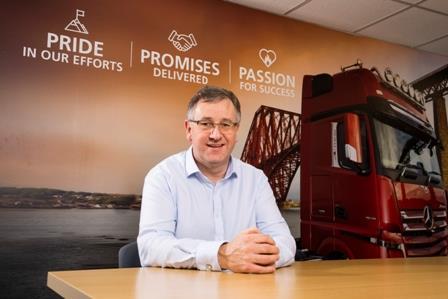
The contract hire sector has seen some high-profile failures in recent months, but Asset Alliance Group continues to go from strength to strength as chief executive Willie Paterson tells Steve Hobson.
With 5,000 owned assets, plus a further 1,500 under fleet management contracts, Asset Alliance Group has grown steadily since it was founded in 2010 in Wolverhampton by Willie Paterson, former director of commercial asset finance at the Alliance & Leicester, which later became part of Santander.
In 2011, private equity investor Cabot Square Capital put up £25m to kickstart the growth strategy of the Group which started with the acquisition of ATE Truck and Trailers Sales in what the company calls “a unique coming together of two sides of the industry, combining the expertise of a CV leasing company with a highly successful retailer of used commercial vehicles”. Cabot Square retains a majority stake in Asset Alliance Group, which acquired assets worth £78m in 2018 and earlier this year added £20m to its existing £155m asset-based lending facility with a group of banks led by RBS.
Despite the concerns surrounding the UK truck market, Paterson remains a perennial optimist.
“I'm very definitely a glass half-full type of guy,” he says. “For sure there's uncertainty in the market, more in the last few months than in the previous two and a half years. There's been an element of ‘let's just hang on and see where this is really going to go’, but we've seen that before, with Euro-6 and the Scottish Independence Referendum.
“Do I know what's going to happen? No, I don't. Do I know the impact it's going to have on the supply chain of my product? No, I don't. Do I know what's going to happen to the cost of my funds? A little bit.
“We have invested as heavily as ever. We've invested in systems, we've invested in people and we've invested in our geographic positioning.”
Growing retail
In keeping with its model of combining contract hire with truck sales, Asset Alliance Group acquired well known truck dealership Hanbury Riverside last year and has since relocated it to premises more than four times the previous size.
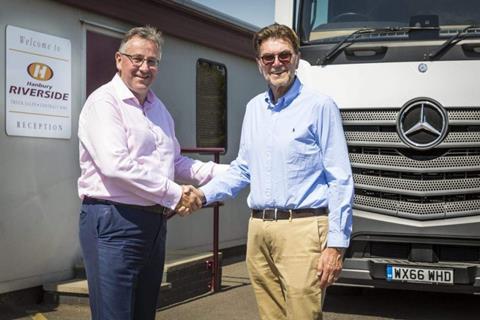
“It's going really well and has integrated well so we want to push it forward,” says Paterson. “Whatever happens with Brexit, you're going to want to have your sandwiches the next day, and I want to be able to supply the truck to the guy that's bringing those sandwiches. We've made quite a lot of changes to our business in the last three years to shorten the lifespan in our assets.
“We've got the youngest fleet in the market. It's entirely Euro-6, it's entirely positioned to be able to react very quickly to environmental controls and financial changes. We've got it as nimble as we possibly can, and we've tried to make sure that the relationships that we have with our suppliers are as close as possible.
“Yes, there's going to be change and uncertainty. Has it stopped me investing? Absolutely not. I'm investing maybe slightly differently, but we've upped our investment to a significantly different level.”
Pre-Brexit buying
The threat of 22% import duties on new vehicles meant many operators brought forward purchases ahead of the original Brexit date of 31 March. Since then Brexit has been delayed and the proposed tariffs cut to 10% and Asset Alliance Group has responded accordingly.
“We always forward buy,” says Paterson. “We had done a deal with as many of the manufacturers as we could, to bring in as strong a number of assets as we could without putting us in a prejudiced position.
“We have a strong buying plan this year and they were all aimed to be in as close to October as we could. I spoke to two very big commercial manufacturers and said, ‘what do we need to be doing differently? Would it be better if I give you a three-year commitment
“There's been a lot of worry in the industry for the last two or three years. We've seen three of our competitors fail. I spent a lot of time talking to the manufacturers, to the banks, to our investors, to our customers, to absolutely assure them that we had a completely different business.
“We're a long-term player. We’re working on our next four-year plan at the moment which will be finished before the end of the year. There is a huge number of variables in there, but we should have a strategy for everything.”
While cost is one of those variables, Paterson says it is not the be all and end all.
“I don't think price is the biggest issue,” he says. “Certainty of supply, parts and support, and confidence in longevity are the biggest issues. We've come through a period where customers are getting phone calls out of the blue and being told that their assets are going to be repossessed, after they've paid the bills perfectly. We're seeing customers who just say, ‘how could this have happened?’
“For me, it's all about certainty, confidence and it's all about understanding that you've got a partnership. I try to have strong relationships. We're in a fortunate position, our business has grown to a reasonable size now, and our job is to leverage those relationships and distribute them through our network of customers.”
The longer Brexit drags on the greater the risk the uncertainty will cause an economic slowdown and a consequent increase in failures among hauliers already working on wafer thin margins.
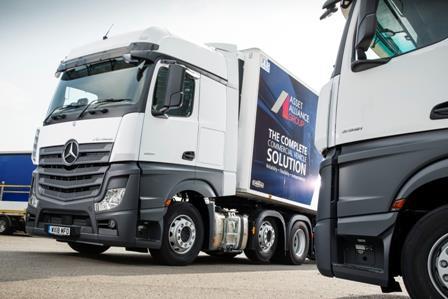
“We monitor the portfolio very closely and I have a very good balance in my portfolio with manufacturers,” says Paterson. “That's actually a good thing because it forces me to remain independent and spread the portfolio concentration across various manufacturers.
“We look at customer exposure and we have internal guidelines and parameters. We look at a residual risk portfolio and we try and make sure that we don't have too many of any one type of truck coming back at any one time in the future.
“The issue is not when you put the deal on the road, the issue is when the deal's coming back. To this day most of the bank funders don't get that. I have an RV system that we've developed and it shows me what my residual exposure is to every manufacturer and to every customer.
“So, if a big customer comes to me and says they want 100 6x2 tractors, push axles, automatic gearboxes etc for a certain period, I would go and pull the data and see what we've got coming back in that period. If we don't have an awful lot I think ‘yes, great that balances it’.
“So, we can be a bit more competitive than we may otherwise have been.”
Despite the industry seeing three business failures in recent times, Paterson says there are still some “crazy” offers out there.
“One of the biggest banks in the UK has just put out a crazy rate because they are clearly not making targets,” he says. “I've worked in banking all my life and I understand what the drivers of that behaviour are. We will do the best deals we can and offer the most competitive package we can. It's a robust package. It works. If you pay your bills, that truck is yours for the period, and the way I've structured my business is that it can't be taken off them.
“The way we fund our business and the way we invest is entirely different from those three businesses, and in fact, most of our competitors.
50% growth
The model is clearly working as the business has grown 50% year-on-year for the last four years. It benefited from one of the recent contract hire failures in Scotland, buying out about 1,000 assets “pretty much overnight”. “We've grown in Scotland significantly,” says Paterson. “In fact, Scotland had its best month ever in the summer, and it did better than anywhere else in the country.”
He says the firm also has “a very strict target” for growing the national fleet in the next three years.
“We've been very deliberate in the way we've changed the fleet renewal, so we're a finance company as well as a contract hire company and a small rental company,” he says. “Getting that balance right is the really important bit. We deliberately wanted to get the fleet as young as possible. Think of change as a sine curve - from Euro-5 to Euro-6 or from diesel to electric – and we have a strategy that says, ‘I have a fleet of 5,000 vehicles that we change every three years’. At certain points, it's spot on and at some points you get a bit of an advantage. At other points you can be miles out.
“Our strategy is to try and stay as close to that as we can, so that there's a maximum level of risk at any point in time. That's the banker in me!
“As my fleet's all Euro-6, which I think is the right place to be right now, certainly in the heavy area, then my risk is very low, which means I can invest in other areas.
“If my assets are funded in a way that I can flexibly change them, which they are, then I can change my customer's fleet very quickly.
“We're trying to be as close to the market as we can. We forward order vehicles every year, based on a new business pipeline from my divisional heads. For custom-specified assets, we go and speak to the customer and then it's a specific order.
“We would be a very large buyer of slots with manufacturers and we try and predict which manufacturers are going to peak at a certain time. Mercedes-Benz was the early adopter in Euro-6, and we went very heavy with Mercedes at that point. We continue to buy a lot of Mercedes product.
“Then DAF came out with a new range of vehicles which became more fuel efficient, so the market followed that. Volvo then reacted to that. We are not tied to any manufacturer, we are independent, to give our customer exactly what they need, and exactly what's right for them.”
Alternative fuels
While the shift from Euro-5 to Euro-6 was not without its issues, the rate of change from diesel to alternative fuels will be even harder to predict. While local authority ultra-low emissions zones will force some operators to adopt low emissions vehicles, the national picture is less clear.
“We have got electric vehicles in our fleet,” says Paterson. “We've got hydrogen vehicles and we've got smart hybrids in our fleet, mostly in the bus business, as our bus business has a big exposure to TfL. That's really good for us because we can have a peek over the fence and try and understand what's happening.
“We sit down with the technical director at companies like Alexander Dennis and say, ‘what do you think is happening? Where are the changes? What do we need to be thinking about? What do we need to learn? What's going to jump me to the front of the queue of change?’
“I definitely believe for most of our customers, there is no one fix. The only safe option for me at the moment is Euro-6, hence why we have a complete brand new fleet of Euro-6 vehicles.
“Electric will work in the light truck area. It doesn't work for everybody and we believe that there's a big future in hydrogen. I was a banker for 30 years, so I'm trained to be sceptical. I would be the first guy to say, ‘no, that's not doable’ but I've changed my opinions rapidly in the last two years. We've spoken to the manufacturers and we’ve spoken to the fuel companies.
“They are rapidly changing what a fuel station looks like. There are already three hydrogen stations in Scotland, and by the end of the year there will be 15. I don't think it'll change with the majority of fleets but with some fleets it'll change very quickly.
“I am being told that is the only option that will hit those [EU carbon reduction] targets, and I know one manufacturer is committing to it.”
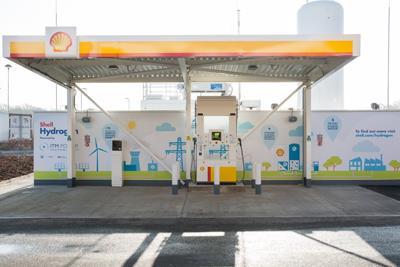
What this means is that customers are increasingly demanding contracts with break clauses so they can take advantage of new technology as it appears.
“Customers with four-year contracts have been replacing vehicles at 18 or 24 months because it can improve efficiency,” says Paterson. “The truck's not necessarily cheaper, but it gives a better whole life cost.
“It also helps me keep my fleet younger. Because of the way I fund my business, it allows me to do that. I can be a lot sharper and a lot more reactive to the customer's needs than maybe some of our competitors. I don't have all the answers, but I am prepared to ask questions and listen.”
Because Asset Alliance Group includes used vehicle retailing it is able to get the maximum residual value from vehicles coming back from contract hire and leasing customers.
“I think we're the only player in the truck finance market that is using every single channel,” says Paterson. “We bought ATE and Hanbury Riverside, we have a rental proposition, we have export and trade capabilities, we sell at auction. We are able to use every single one of the exit strategies.
“I am looking at how we can become more efficient and retail is a key part of our growth. We've invested heavily in Hanbury because I want to expand what they do.
“They've just moved to their bigger, purpose-built premises and added trailers, we are seriously looking at opening another retail depot.
In the last two years, Paterson has “significantly changed” the way Asset Alliance Group handles the maintenance and refurbishment of its fleet from the Wolverhampton HQ.
“When we bought the ATE business, we set up a 120,000sq ft VMU with an ATF, sandblasting, fabrication and paint shop,” he says. “In the last few years, I've significantly changed that, so the facilities are still here but we've brought in experts in every sector instead of us trying to manage all that. The old ATE business was traditionally bringing back an eight-year-old truck, refurbing it and selling it. My fleet won't be any older than five years typically, so we don't need to do that.
“We brought C&C on board and they've taken over the workshop and the fabrication. Another company has taken over the ATF and the VMU, but we have great relationships with every manufacturer. I've got a 24-hour call centre based here, so all the fleet management is done in-house. We've invested heavily in the technology and the people that run it, and we will grow that and utilise our network of third-party vendors. Our new computer system (see panel) is very focused on that. We're partnering with R2C and CLS to link their networks with our platforms.”
Asset Alliance Group’s headcount fell slightly when it outsourced its workshops but has since risen back to 107 with its consistent growth.
“The strategy is to take that up by 25% over the next two-and-a-half years,” says Paterson. “That's what we think we're going to need to grow the business.”
More miles on the clock
As operators look to work trucks harder, even if they come back after two years rather than three or four, they often have more miles on the clock than before.
“We're a specialist commercial vehicle lender, so we understand the impact of mileage and use, so our return conditions are very specific,” says Paterson. “Our fact-finding, when we speak to customers, is very specific. We want to know what they're using it for because you'd be surprised how many customers just do what they've always done, and we like to challenge that.
“We like to say, ‘hang on a second, I know you're asking me for this spec and I know you're telling me that you want 160,000kms per annum, but for the last two years you've been doing 250,000kms, and it's not cost effective to do it that way’.
“I learn by asking the questions and I learn by listening to what my people say. It used to be 120,000kms per annum and that was a big mileage. Now it's 160,000kms to 250,000kms and so the end of life value in a truck is changing too.
“It's only retail if it's three years old and under 500,000kms now. Hence, I've made my fleet younger. If I've got a customer that's clearly heading to mileage above that, we m
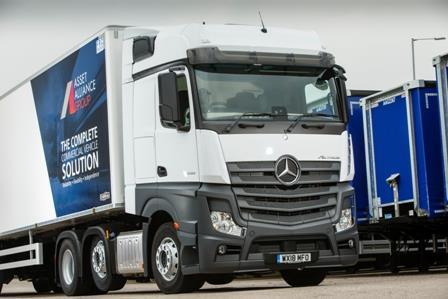
onitor it every six weeks. We've got the data coming into our business. It sends up flags that say, ‘Mr Customer, are you aware that something's not right? You've got one vehicle that's an anomaly.’
“We'll talk about that. We don't want an argument after three years because I've got a truck that's done 900,000kms when I thought it was going to have 450,000kms on it. They've got a bill, I've got a difficult asset to sell because I planned to do something else. So we're better having that conversation on day one.”
The technology required to achieve Euro-6 emissions control mean these vehicles will not run on high sulphur diesel found in many traditional export markets such as Africa, closing off this disposal route for returning Euro-6 trucks.
“It's been difficult,” agrees Paterson. “The exchange rate didn't help. I've got a lot of Euro-6 Mercedes. We were the first adopter, and we bought a lot of the early Actros MP3. It was the best tractor in the world to export.
“For the later Euro-6s we have worked very closely with Mercedes and we have come up with a solution. We're changing the specification of the truck, and they're changing the availability of parts in that region to do it. By working in collaboration we're now managing to export Euro-6 Mercedes into Africa.”
Big money going into new IT systems
Asset Alliance Group has invested £1m in a new IT system designed to reduce operating costs while dramatically improving operational efficiency. “It will give me quicker, sharper data,” says Paterson. “It will give us the ability to link fleet management, vehicle operation, telematics and finance; it brings every part of our business into one platform.
“If a customer phones up wanting to know what their interest bill will be for the year ahead, our team can go on that system and say, ‘no problem, here's your number. And by the way, do you realise you've got a vehicle that's been broken down for two days?’ It's bringing everything customer focused onto one screen.”
The new IT system also pulls together systems from the series of acquisitions in recent years.
“We've bought six companies in five years,” says Paterson. “We've just bought Valley Finance in the bus sector, which differentiates us again.
“It's about the ability to react better and serve better, and sometimes that's not always all about cost. If somebody phones up for one reason, and that person's dealing with it, but they're not aware of something else that's happening, the very fact that you can see to that in one phone call, the customer just gets that confidence factor. They just say, ‘these people know what they're talking about. They might not be the cheapest, but the fact is they just do what they say they're going to do so instead of me making five phone calls to get a host of issues done, I can make one phone call.’ The system brings everything together to allow us to do that.”
Making the most of telematics
Once Asset Alliance Group has completed its new IT system it will turn its attention to getting the most from telematics.
“We are working very heavily on our telematics,” says Paterson. “The future is about information and so leading manufacturers like Mercedes and DAF will come to me and say, ‘you can have access to all the source codes and actually we've developed an app’, and that's really good, but very few of my customers only operate a single brand of trucks..
“I want to be able to give them the right product, and we want to be able to mix those products with ease. We want to make sure that we've got the very best data and that it's coming to us. We want to make sure that we've got the best people that understand that data and can script a report that's best for our customer.
“So we are looking very closely at what's the new world of information and telemetry, and how will that change if we can move away from diesel towards electric and hydrogen.”
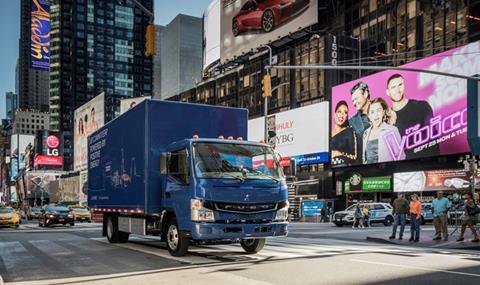
Using telematics to spot faults before a breakdown will benefit both Asset Alliance Group and its customers, the operators.
“It means that I can go to my customer proactively when a fault is detected instead of a customer phoning one of my competitors and complaining because the vehicle's been broken down for three hours, and it's got a load of £1m worth of prawns in the back,” says Paterson. “It means that we can phone the customer before it's broken down and say, ‘we know your vehicle's 36 miles north of Manchester and it's got a four-code fault on it right now’.
“So we know what these typical faults are and, for a really good customer relationship, we can say ‘we think you should pull into Manchester, there's a part sitting ready for you and the driver can take his 45-minute break and we'll have it done in that period’. I am his best friend when I do that.”
The system also highlights known problems and heads them off before they can cause reliability issues.
“There may be something that says, ‘manufacturer X has a known problem over 500,000kms with a certain type of gearbox’. We can do that now, so I'll say, ‘OK, pick the phone up to that manufacturer. What do we know about this? What are we going to do about it? Let's go and identify those customers and see if there's an opportunity to take that out before it causes them a problem’.”
Asset Alliance Group is able to do this because its vehicles are not funded specifically for each contract. “We have a unique funding and investment structure in our business,” says Paterson. “I can change any vehicle at any time regardless of whether it's on a five-year contract or a four-year contract. The arrangement with our customers is flexible. I have the right to go to the customer and say to them, ‘I would like to replace that truck with you’.
“As long as I can do it on a beneficial basis to them then we generally have an agreement. Crucially, a bank can't do that.”
As well as highlighting mechanical issues, telematics has a growing role in how the vehicle is driven.
“We've worked hand in hand with some customers to put a really good telematics process in place,” says Paterson. “We tell them everything from fuel efficiency, harsh braking, idling and other key behaviours.
“You've got telematics, GPS tracking, cameras and various other data communication channels available to you. There's not really one system at the moment that does all of that effectively. We think there is scope for that.
“Drivers are a big issue in the industry, and it remains the one thing that every customer tells me about. There must be something that can help us train and reward a better driver. That's an area that I'm quite interested in at the moment.”














